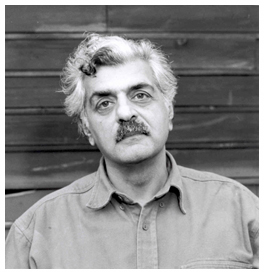How do you know what you know about the world? From the evening news? A reading of the Quran? A trip to Brazil? However you construct your world view, it has cultural limits. Gaining true understanding of today's world requires recognizing and then transcending these limits; not merely expanding, but forging new views altogether.
The Walker Art Center and the University of Minnesota's Humanities Institute, Institute for Global Studies, and European Studies Consortium present New Ideas on Globalization, a five-night series of free lectures. Encouraging audiences to put forth their own questions, the series features a diverse group of international thinkers in discussions that range from art history to war and politics to pilgrimage and its implications on the global community.
The discussion begins on February 25 with a broad look at history by novelist-author-playwright Tariq Ali. Long-standing editor of the
New Left Review, Ali examines changing attitudes toward global politics as well as the effects of current military technology on the physical world.
During his April 1 visit, Salah Hassan,
NKA editor and Chair of Cornell University's Department of History of Art, discusses the body in contemporary African and diaspora art practices.
On April 8, media scholar Siva Vaidhyanathan, author of
The Anarchist in the Library: How Peer-to-Peer Networks Are Transforming Politics, Culture, and the Control of Information, discusses the struggle for control over information in the age of electronic communication. He draws upon examples ranging from ancient religions to open-source software to show how this battle will be one of the defining fault lines of 21st-century civilization.
Carol Becker, critic and Dean of Faculty at the School of the Art Institute of Chicago, recounts her experiences leading a group of student artists to sites of some of Vietnam's harshest atrocities: Hanoi, the former Saigon, Da Nang, Hue, the Mekong Delta, Khe Sahn, the DMZ, and My Lai. In her April 15 lecture, she suggests that excursions to places of trauma bring the history of prior generations to the next one and expand the complexities of globalization.
These compound understandings of globalization set the stage for the final event of the series: What exactly does the term mean? For some, it holds out hope for the creation of new communities and unforeseen solidarities, but to others it is a euphemism for corporatization and imperial expansion. On April 22, Marxist geographer Neil Smith, author of
Uneven Development, debates a local representative from the Federal Reserve Board on globalization's virtues and pitfalls.
The University of Minnesota Humanities Institute was founded in 1998 to promote collaborative, interdisciplinary research in the arts and humanities. The Institute is designed to be a place of intellectual and creative synergy, where collective energies are brought to bear on significant issues to produce new ways of knowing.
http://www.cla.umn.edu/umhi/
Founded in 1998, the Institute For Global Studies fosters interdisciplinary faculty and graduate student research on global themes, organizes interdisciplinary faculty seminars, serves as coordinating unit for a range of campus centers and programs focused on global issues, and houses an undergraduate Global Studies major.
http://igs.cla.umn.edu/
The European Studies Consortium (ESC) at the University of Minnesota was established in the spring of 1999 to promote and support inquiry into Europe related issues that engage scholars across disciplinary and collegiate borders.
http://esc.cla.umn.edu/










